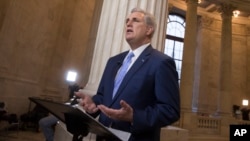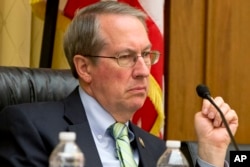House Republican lawmakers dropped plans Tuesday to gut the independent authority of an ethics panel on the opening day of a new session of Congress, just hours after President-elect Donald Trump assailed their effort.
"With all that Congress has to work on, do they really have to make the weakening of the Independent Ethics Watchdog, as unfair as it may be, their number one act and priority," Trump said in a Twitter message after the Republican lawmakers met behind closed doors Monday night to put the ethics group under their own control in the House Ethics Committee.
Trump said the lawmakers should "focus on tax reform, healthcare and so many other things of far greater importance!" and urged them to "drain the swamp" of influence peddlers in Washington.
The ethics change was part of a rules package the full House was expected to vote on as its 438 members were sworn in for new two-year terms.
The 119-74 vote among Republicans for the change was a reflection among some lawmakers that the independent panel had unfairly targeted them while investigating complaints from the public of wrongdoing.
Under fire
But House leaders dropped the ethics change after Trump, Democrats and outside watchdog groups attacked it.
"People didn't want this story on opening day," said one Republican leader, Congressman Tom Cole of Oklahoma.
Minority Leader Nancy Pelosi said, "Republicans claim they want to 'drain the swamp,' but the night before the new Congress gets sworn in, the House [Republicans have] eliminated the only independent ethics oversight of their actions. Evidently, ethics are the first casualty of the new Republican Congress."
Democratic Senator Elizabeth Warren said House Republicans were "gutting its ethics office in the middle of the night."
Chris Carson, president of the League of Women Voters, said, "We all know the so-called House Ethics Committee is worthless for anything other than a whitewash -- sweeping corruption under the rug. That's why the independent Office of Congressional Ethics has been so important. The OCE works to stop corruption and that's why Speaker Ryan is cutting its authority. Speaker Ryan is giving a green light to congressional corruption."
Non-partisan OCE
The non-partisan Office of Congressional Ethics (OCE) was established 2008 in response to a number of high-profile bribery and corruption scandals involving House members.
Congressman Bob Goodlatte, a Virginia Republican who called for the change, said that with the revision of the ethics complaint process, any referrals to law enforcement agencies about wrongdoing would have had to be voted on by fellow lawmakers on the Ethics Committee.
He said the new rule would have built on and strengthened the investigative role of the original panel, though, and "would improve due process rights for those under investigation and give protections against disclosures to the public."
The new rule would have forced the OCE to adopt a provision prohibiting it from "accepting or considering any anonymous allegation."
The OCE would have been prohibited from reviewing any alleged violation that happened before 2011. As it stands, the rule still limits the OCE's work to allegations dating only to early 2008.
Lawmakers also would have been barred from making any public statement or releasing any information to the public unless that material already has been made public by the Ethics Committee. The change would have prohibited the independent panel from hiring "any person for a position involving communications with the public," such as a press spokesperson.
Other changes would have extended the amount of time the ethics board members had to complete their preliminary review of an allegation, and more specifically, spell out what materials they had to turn over to the Ethics Committee after a final review was completed and lawmakers reported their findings and recommendations.











